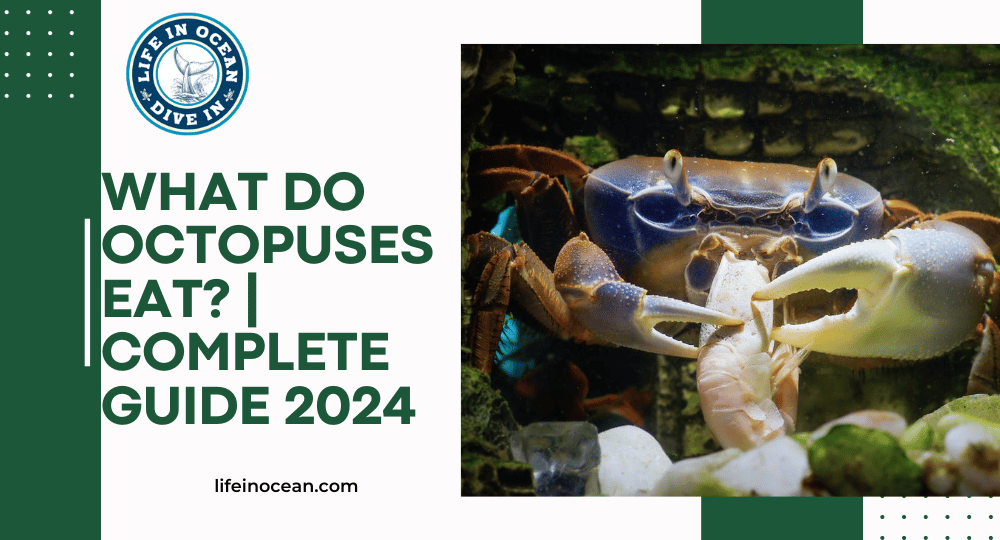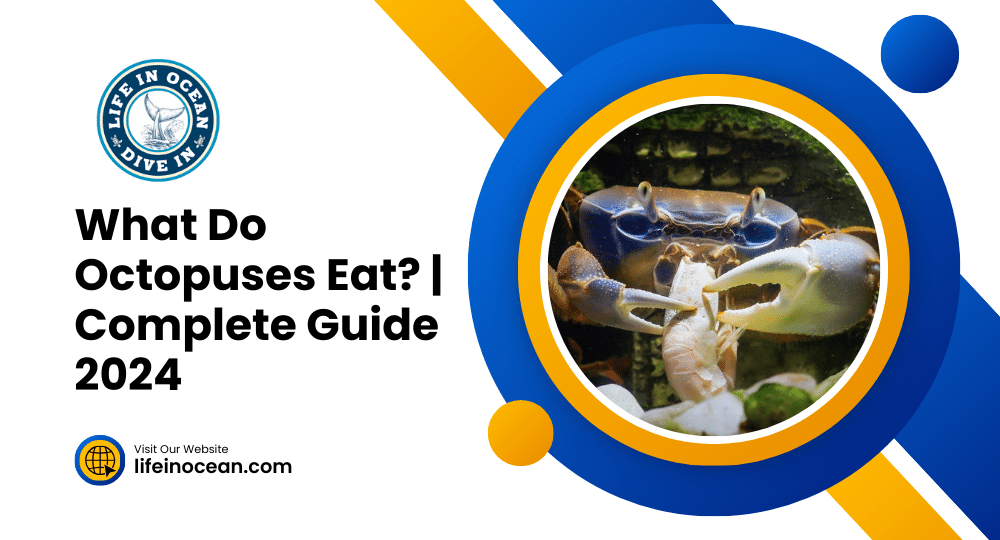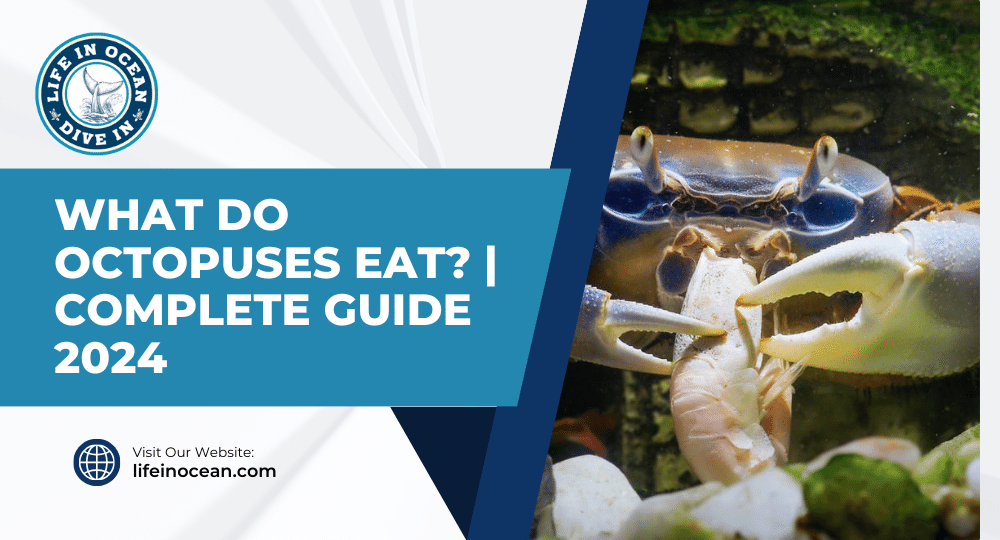Ever wondered what do octopuses eat and squids feast on in the depths of the ocean? These sea animals, along with other sea mollusks, find their food on the seabed. Prepare to be amazed by their extraordinary dietary habits. These captivating sea animals, such as invertebrates and small fishes, have a diverse diet that varies depending on their species and habitat. They are opportunistic predators. From shells and prey to sea mollusks, organisms, and even tools, octopuses have an incredible way of finding sustenance in the underwater world. They are opportunistic predators that scavenge the seabed for food.
Understanding what octopuses eat in the ocean is not only fascinating but also crucial for their conservation and well-being. Octopuses primarily feed on small fishes and other marine creatures found on the seabed and in the water. Octopuses, including pet octopuses, have the remarkable ability to touch, taste, and manipulate objects with their highly flexible bodies. This allows them to navigate their environment, whether it be water for water octopuses or land for finned octopuses, with ease. Octopuses also eat a variety of food to sustain themselves. Did you know that some octopus species, such as water octopuses and finned octopuses, can even use jet propulsion to chase down their prey? These jet-propelled, sized octopuses are truly remarkable creatures.
Get ready for an adventure as we unravel the secrets of what lies inside the diet of water octopuses and sized octopuses.
Table of Contents
What Do Octopus Eat?
Octopuses have quite the appetite! These fascinating pet octopuses primarily feast on crustaceans, mollusks, and fish. They are sized octopuses. Pet octopuses have a diverse diet that includes eating a wide range of marine animals, such as octopuses. Let’s explore what these clever pet octopuses like to munch on.
Crustaceans, Mollusks, and Fish
Octopuses are big fans of crustaceans like crabs and lobsters. These tasty treats provide them with a hearty meal full of protein and essential nutrients. Octopuses also enjoy indulging in mollusks such as clams and snails. Their strong beaks help them crack open the shells effortlessly.
But it doesn’t stop there! Octopuses have a particular fondness for fish. They use their incredible camouflage skills to sneak up on unsuspecting finned creatures before pouncing on them with lightning speed. Squid is another delicacy that often finds its way onto an octopus’ menu.
Other Marine Animals
While crustaceans, mollusks, and fish make up the main course for most octopuses, some species are known to diversify their palate even further. Water-dwelling octopuses can’t resist the temptation of worms wriggling about in the depths below. These slimy snacks provide an extra source of sustenance for these hungry hunters.
In addition to worms, certain-sized octopuses may also consume other marine animals like jellyfish. Although they might not seem like a typical meal choice due to their gelatinous nature, octopuses skillfully maneuver around their stinging tentacles to enjoy a jellyfish feast without getting stung.
A Surprising Feast
Believe it or not, adult octopuses are even capable of devouring small sharks! While this might sound astonishing given the size difference between an octopus and a shark, these clever creatures have been known to take advantage of their agility and intelligence to outmaneuver their larger prey.
How Do Octopus Hunt For Food?
Octopuses are great at hiding and catching their food. They blend in with their surroundings using their skin and wait for the perfect moment to strike. When they find a good hiding spot, they stay still and watch everything around them. Then, when their prey gets close enough, they shoot out their tentacles and grab it fast. The tentacles of the mimic octopus, umbrella octopus, and blue-ringed octopus have suckers that help them hold onto their prey.

Additionally, these octopuses also possess a specialized structure known as the octopus beak. These suckers also help the octopus taste and smell its food. Octopuses eat lots of different things, like crabs, shrimp, fish, clams, and even other octopuses! Sometimes they even use tools, like coconut shells, to protect themselves while they hunt. Some octopuses can also pretend to be other animals or objects to trick their prey.
What Do Baby Octopus Eat?
Baby octopuses, also known as hatchlings, have a different diet compared to adult octopuses. These tiny creatures start their lives by feeding on small organisms such as plankton or larvae. As they grow larger and develop stronger hunting abilities, their diet gradually expands.
One of the main sources of food for baby octopuses is small crustaceans like shrimp. These little critters provide the necessary nutrients for the growing hatchlings. With their nimble tentacles and sharp beaks, baby octopuses can capture and consume these crustaceans with ease.
In addition to shrimp, baby octopuses may also feed on other small marine animals such as crabs and mollusks. Their flexible bodies allow them to squeeze into tight spaces in search of prey. This enables them to hunt down a variety of food sources in their surrounding habitat.
It’s important to note that the specific diet of baby octopuses can vary depending on their species and environment. Some species may have preferences for certain types of prey or rely on specific food sources that are abundant in their habitat.
As baby octopuses continue to grow, they become more skilled hunters and expand their menu even further. They start targeting larger prey items such as fish and other cephalopods. This includes what eats octopus. Their ability to adapt their feeding habits allows them to survive and thrive in various marine ecosystems.
To summarize:
- Baby octopuses typically feed on tiny organisms like plankton or larvae.
- Small crustaceans like shrimp are often part of a baby octopus’s diet.
- As they grow larger, baby octopuses may also consume crabs, mollusks, fish, and other cephalopods.
- The specific diet can vary depending on the species and environment.
Understanding what baby octopuses eat provides valuable insight into their early development stages. By consuming a diverse range of prey, including what do octopus eat, these young cephalopods gain the necessary energy and nutrients to grow into strong and capable adults. Additionally, they must be cautious of what eats octopus in order to survive and thrive in their marine environment.
Common Types of Food for Octopuses
Octopuses have quite the appetite! These clever giant pacific octopus, a popular octopus species, are known to devour a variety of tasty treats from the sea, including the coconut octopus. Let’s explore some of the common types of food that octopuses love to munch on.
Crustaceans: Crab, Lobster, and Shrimp
Octopuses have a particular fondness for crustaceans. They delight in feasting on crabs, lobsters, and shrimp. These crunchy critters provide a satisfying meal for our eight-armed friends. With their strong suckers and sharp beaks, octopuses can easily crack open the shells of these crustaceans to access their succulent meat.
Mollusks: Clams, Mussels, Oysters, and Scallops
Octopuses also enjoy indulging in mollusks. Clams, mussels, oysters, and scallops are among their favorite delicacies. These bivalve mollusks offer a soft and delectable treat that satisfies their taste buds. Using their dexterous tentacles, an octopus can pry open the shells or even drill through them with its radula (a rough tongue-like structure) to savor the tender flesh inside.
Fish: Anchovies, Herring, Sardines, and More
Octopuses eat a lot of different things, not just seafood with shells. They also eat fish like anchovies, herring, and sardines. Sometimes, they even catch small sharks! Octopuses can eat other sea creatures too, like sea urchins and jellyfish. They are good at finding food and have cool ways of catching it. Octopuses are awesome survivors in the ocean!
Octopus Eating Habits
Octopuses are fascinating creatures with unique eating habits. They are opportunistic predators, meaning they adapt their feeding behavior based on what food is available to them. Let’s explore the various eating habits of octopuses and how they obtain their meals.
Scavenging Behavior and Active Hunting
Octopuses have a diverse range of feeding strategies. They exhibit both scavenging behavior and active hunting techniques to acquire their food. As opportunistic predators, they take advantage of any opportunity that presents itself.
Octopuses will feast on whatever they come across in their environment. This can include dead animals or leftovers from other predators. They use their strong sense of smell to locate potential meals and rely on their flexible arms to reach into crevices or cracks where food might be hiding.
On the other hand, when actively hunting for prey, octopuses employ clever tactics. Some species display specialized feeding techniques suited to specific prey items. For example, the giant Pacific octopus has been observed using its long arms to snatch crabs from rocky surfaces or fish from open water.
Varied Prey Items
Octopuses have a wide-ranging diet that includes various sea creatures. Their menu consists of crustaceans such as crabs and shrimp, small fishes, mollusks like clams and mussels, and even other cephalopods (a group that includes squids and cuttlefish). These intelligent creatures are skilled at capturing and consuming different types of prey.

For instance, when an octopus encounters a crab, it uses its powerful suckers to grab hold of the shellfish’s body while carefully avoiding its sharp claws. The octopus then pierces the crab’s exoskeleton with its beak-like mouthparts called a radula before injecting venom that paralyzes the crab’s muscles. This immobilizes the crab, making it easier for the octopus to consume its meal.
Adaptation and Flexibility
One remarkable aspect of octopus eating habits is their ability to adapt and be flexible in their feeding behavior. They can adjust their hunting techniques depending on the size and type of prey they encounter. For example, when faced with small crabs or other small crustaceans, an octopus may use its arms to immobilize and manipulate the prey before consuming it.
Some octopuses have been observed using tools to aid in their feeding. They might gather shells or rocks to create protective barriers around themselves while they eat, preventing other animals from stealing their food.
Nutritional Value of Octopus Food
Octopus meat is not only delicious but also packed with nutrients that are beneficial for our health. Let’s take a closer look at the nutritional value of octopus food.
Low in Fat, High in Protein, Vitamins, and Minerals
Octopus meat is a winner. It is low in fat and calories, making it an excellent choice for those watching their weight or trying to maintain a healthy diet. At the same time, it is rich in protein, which is essential for building and repairing tissues in our bodies.
Protein isn’t the only thing that octopus brings to the table. It is also loaded with vitamins and minerals that contribute to overall well-being. Octopus contains significant amounts of vitamin B12, which helps keep our nerve cells healthy and aids in the production of red blood cells. It provides vitamin E, which acts as an antioxidant and supports healthy skin.
Essential Amino Acids for a Healthy Diet
Amino acids are the building blocks of protein. Our bodies require certain amino acids that we must obtain from food sources since they cannot be produced internally. Octopus meat contains these essential amino acids, making it an excellent addition to a balanced diet.
These amino acids play vital roles in various bodily functions. For example, they support muscle growth and repair after exercise or physical activity. They also aid in hormone regulation and help boost our immune system.
Omega-3 Fatty Acids for Heart Health
One standout feature of octopus meat is its omega-3 fatty acid content. These healthy fats have been linked to numerous health benefits, particularly. Omega-3s can help reduce inflammation, lower blood pressure levels, improve cholesterol profiles, and decrease the risk of heart disease.
Including octopus as part of your regular diet can be a tasty way to incorporate omega-3 fatty acids into your meals. These fats are not only good for your heart but also beneficial for brain health and overall well-being.
Foods That Octopuses Avoid Eating
Octopuses, just like humans, have their food preferences. While they are known to be voracious eaters, there are certain foods that they tend to avoid. Let’s take a closer look at the types of foods that octopuses steer clear of.
Toxic or Venomous Prey
Octopuses are smart creatures and have developed strategies to protect themselves from harm. One way they do this is by avoiding toxic or venomous prey. They have an innate ability to recognize and stay away from creatures that could potentially harm them with their toxins or venom. This includes species such as poisonous fish or venomous sea snakes.
Species with Hard Shells or Spines
Octopuses have soft bodies and don’t possess any protective armor like other marine animals such as crabs or lobsters. Therefore, they tend to avoid consuming species with hard shells or spines that could pose a threat to them. These hard shells can be difficult for the octopus to break open and may cause injury if not handled properly.
Specific Preferences
In addition to avoiding toxic prey and species with hard shells, some octopuses also have specific food preferences. Just like how some humans may dislike certain foods, octopuses too can be picky eaters. They may reject certain food items even if they are safe to consume. It is believed that these preferences could be influenced by factors such as taste, texture, or even past experiences.
For example, some octopus species show a preference for crabs over other types of prey. They might actively seek out crabs in their environment while ignoring other potential food sources. This selectivity in diet helps them maximize their chances of obtaining the most nutritious and easily accessible food available.
Conclusion
And there you have it, a deep dive into the world of octopus food! We’ve explored what octopuses eat, how they hunt for food, and even their eating habits. From crustaceans to fish, octopuses have a diverse diet that keeps them well-nourished and thriving in their underwater habitats.
But it’s not just about the food itself; it’s also about understanding the fascinating ways in which octopuses interact with their environment. Their ability to camouflage, their intelligence in finding prey, and their unique feeding techniques all contribute to their success as predators.

So, next time you spot an octopus at an aquarium or while diving, take a moment to appreciate the incredible adaptations that allow them to find and devour their favorite meals. Perhaps, consider exploring more about these amazing creatures and the intricate web of life that exists beneath the waves.
FAQs
What do octopuses eat?
Octopuses have a diverse diet that includes crustaceans, mollusks, and fish. The mimic octopus, known for its ability to mimic other creatures, is a skilled hunter that uses its tentacles and octopus beak to capture prey. It is important to note that the blue-ringed octopus and umbrella octopus also possess similar hunting techniques. Some octopuses even can open shells to access their food.
How often do octopuses eat?
Octopuses typically feed once or twice a day, depending on the availability of food and their metabolic rate. They have a fast metabolism and need regular meals to sustain their energy levels.
Can octopuses eat humans?
No, octopuses cannot eat humans. While they are formidable predators in the ocean, they pose no threat to humans in terms of consumption. Octopuses prefer smaller prey that they can easily overpower.
Do octopuses have any favorite foods?
Octopuses don’t necessarily have favorite foods, but they do exhibit preferences based on what is available in their environment. Some species may show a preference for certain types of prey, but it varies among individuals.
How do octopuses catch their food?
Octopuses use their incredible camouflage abilities and long tentacles to catch their food. They patiently wait for prey to come within reach before swiftly grabbing it with their strong suction cups. Their flexible bodies allow them to maneuver through tight spaces while hunting.

